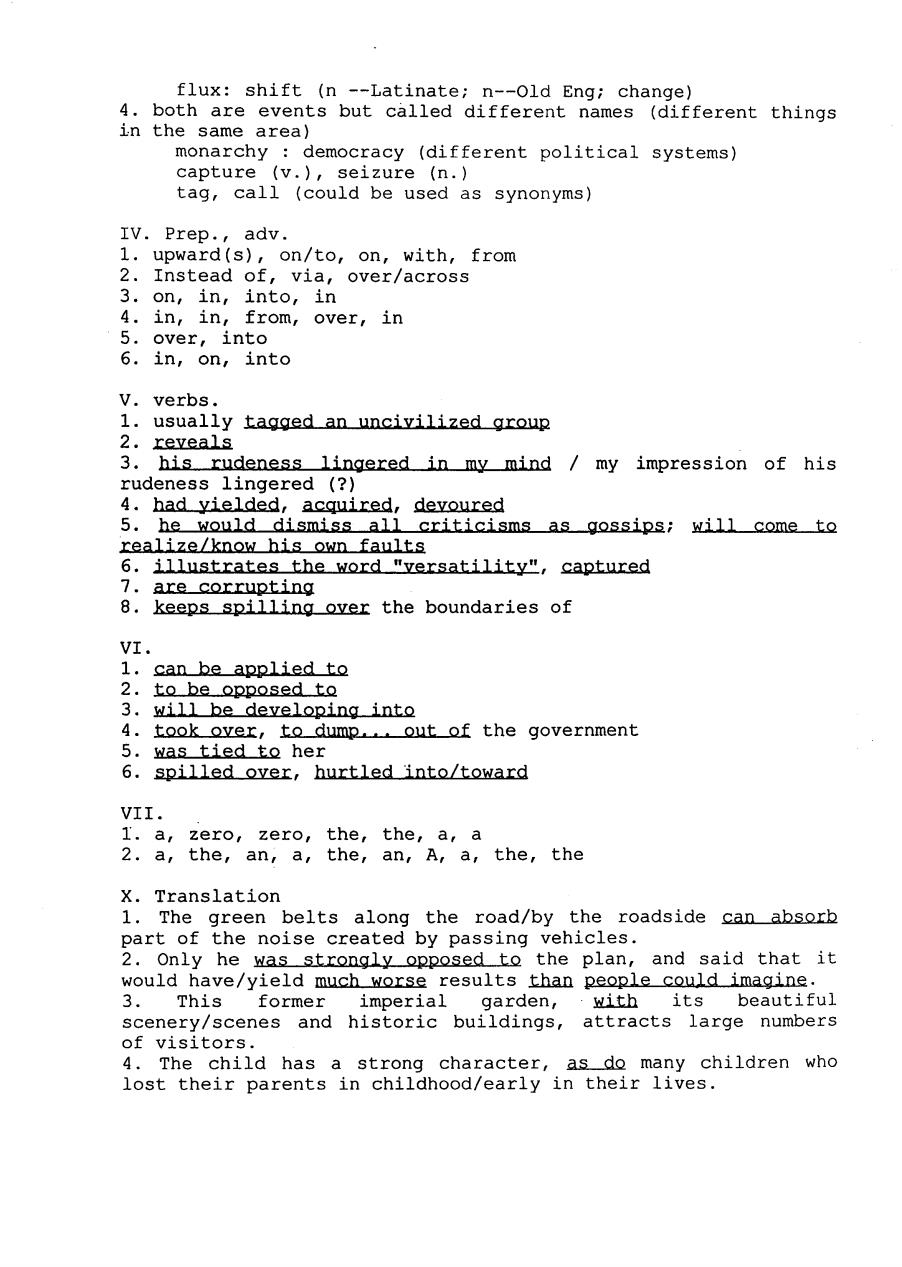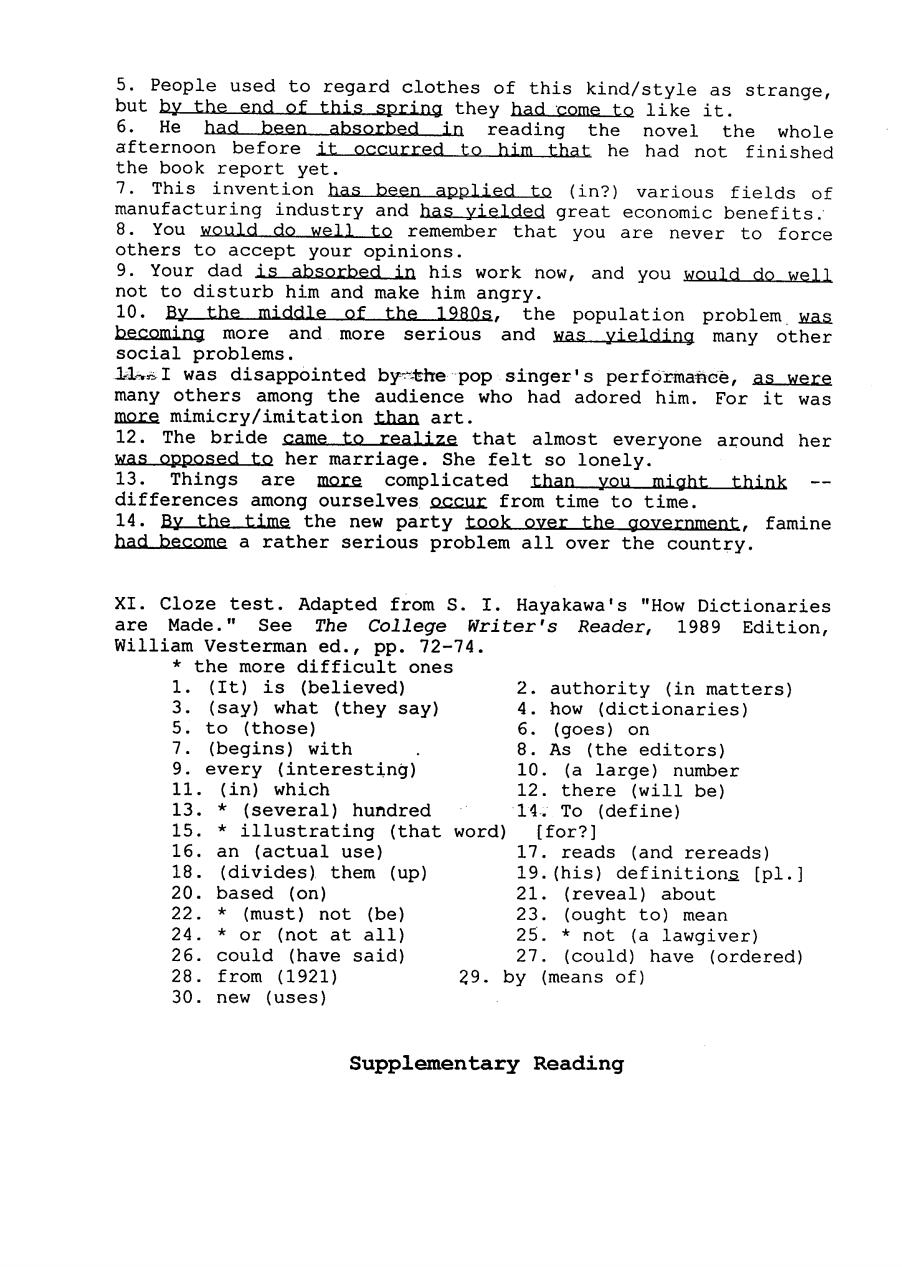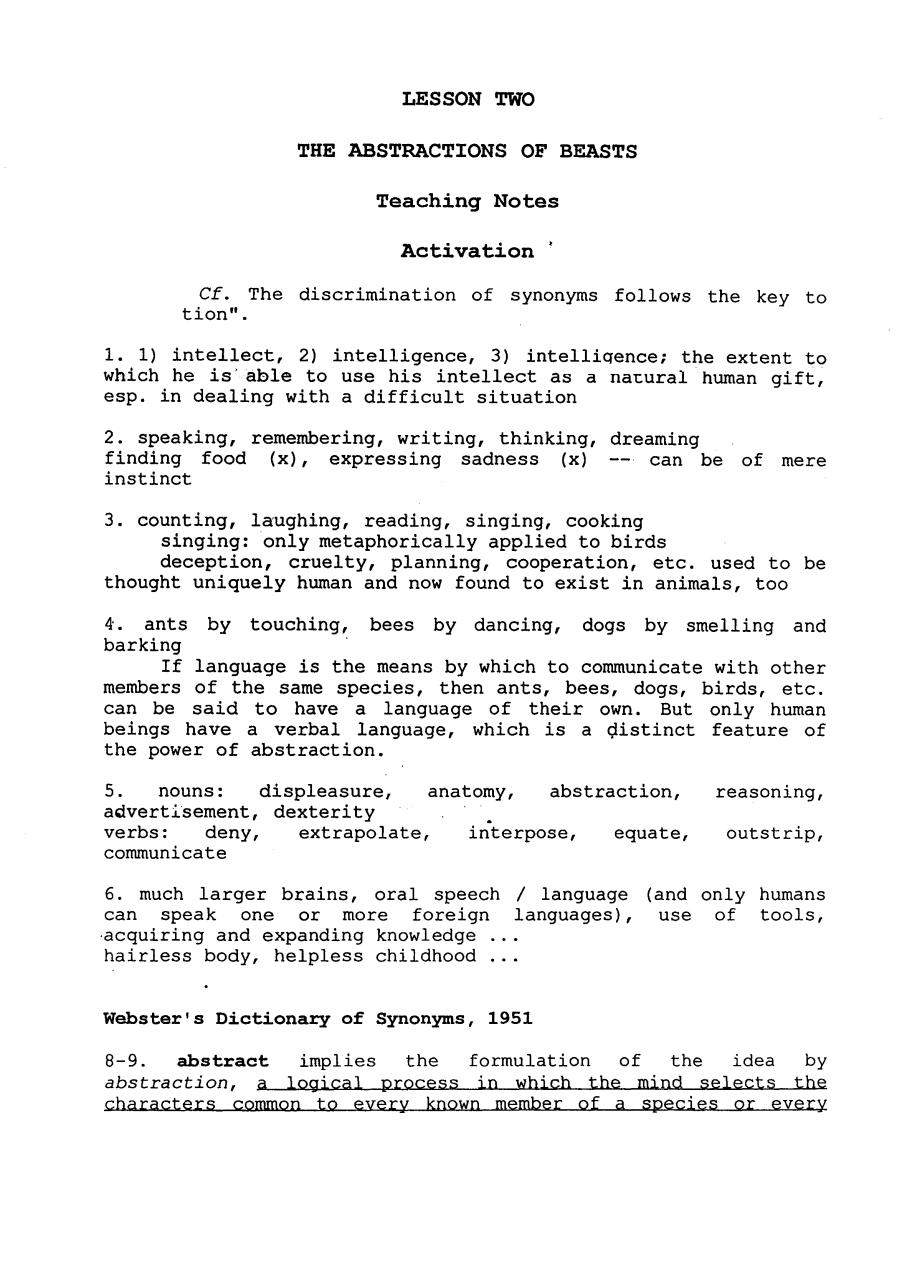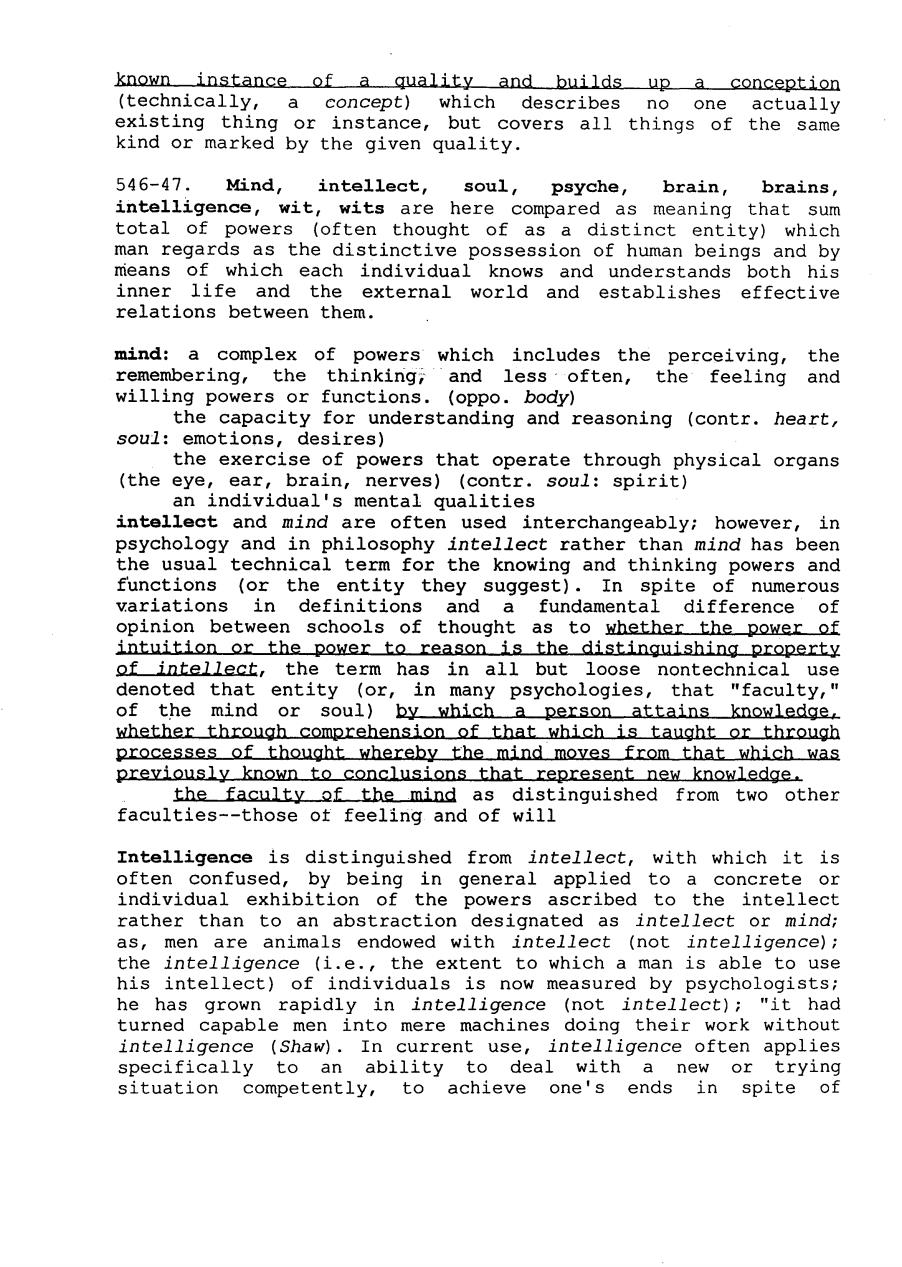
flux:shift (n --Latinate;n--0ld Eng;change) 4.both are events but called different names (different things in the same area) monarchy democracy (different political systems) capture(v.),seizure(n.) tag,call (could be used as synonyms) IV.Prep.,adv. 1.upward(s),on/to,on,with,from 2.Instead of,via,over/across 3.on,in,into,in 4.in,in,from,over,in 5.over,into 6.in,on,into V.verbs. 1.usually tagged an uncivilized group 2.reveals 3.his rudeness lingered in my mind my impression of his rudeness lingered (? 4.had yielded,acquired,deyoured 5.he would dismiss all criticisms as gossips;will come to realize/know his own faults 6.illustrates the word "yersatility",captured 7. are corrupting 8. keeps spilling over the boundaries of VI. 1.can be applied to 2.to be opposed to 3.will be developing into 4. took over,to dump out of the government 5.was tied to her 6.spilled over,hurtled into/toward VII. 1.a,zero,zero,the,the,a,a 2.a,the,an,a,the,an,A,a,the,the X.Translation 1.The green belts along the road/by the roadside can absorb part of the noise created by passing vehicles. 2.Only he was strongly opposed to the plan,and said that it would have/yield much worse results than people could imagine. 3.This former imperial garden,with its beautiful scenery/scenes and historic buildings,attracts large numbers of visitors. 4.The child has a strong character,as do many children who lost their parents in childhood/early in their lives

5.People used to regard clothes of this kind/style as strange, but by the end of this spring they had come to like it. 6.He had been absorbed in reading the novel the whole afternoon before it occurred to him that he had not finished the book report yet. 7.This invention has been applied to (in?)various fields of manufacturing industry and has yielded great economic benefits. 8.You would do well to remember that you are never to force others to accept your opinions. 9.Your dad is absorbed in his work now,and you would do well not to disturb him and make him angry. 10.By the middle of the 1980s,the population problem.was becoming more and more serious and was yielding many other social problems. 11I was disappointed by the pop singer's performance,as were many others among the audience who had adored him.For it was more mimicry/imitation than art. 12.The bride came to realize that almost everyone around her was opposed to her marriage.She felt so lonely. 13.Things are more complicated than you might think differences among ourselves occur from time to time. 14.By the time the new party took over the government,famine had become a rather serious problem all over the country. XI.Cloze test.Adapted from S.I.Hayakawa's "How Dictionaries are Made."See The College Writer's Reader,1989 Edition, William Vesterman ed.,pp.72-74. the more difficult ones 1.(It)is (believed) 2.authority (in matters) 3.(say)what (they say) 4.how (dictionaries) 5.to (those) 6.(goes)on 7.(begins)with 8.As (the editors) 9.every (interesting) 10.(a1arge)number 11.(in)which 12.there (will be) 13.*(several)hundred 14.To (define) 15.*illustrating (that word)[for?] 16.an (actual use) 17.reads (and rereads) 18.(divides)them (up) 19.(his)definitions [pl. 20.based (on) 21.(reveal)about 22.*(must)not (be) 23.(ought to)mean 24.*or (not at all) 25.not (a lawgiver) 26.could (have said) 27.(could)have (ordered) 28.from(1921) 29.by (means of) 30.new (uses) Supplementary Reading

(11.5,6)When Harold fell at Hastings --About 1064,the powerful English noble,Harold,earl of Wessex,was shipwrecked on the Norman coast and taken prisoner by William,duke of Normandy.He secured his release by swearing to support William's claim to the English throne.When King Edward died, however,the witenagemot (royal council)elected Harold king. Determined to make good his claim,William secured the sanction of Pope Alexander II for a Norman invasion of England.The duke and his army landed at Pevensey on Sept.28,1066.On October 14,the Normans defeated the English forces at the celebrated Battle of Hastings,in which Harold was slain.William then proceeded to London,crushing the resistance he encountered on the way.On Christmas Day he was crowned king of England in Westminster Abbey....By 1070 the Norman conquest of England was complete. Learn and explain:aquarium (1.18),game (1.24),resilient (1.36),volatile speech rhythms (1.43),a reservoir of synonyms (11.53,54),abound in (1.55),textured (1.56), potential for nuance (1.62). Points for discussions; 1.English is the language of survivors,of conquerors. 2.big words (drawn from a more Latinate pool)and small words (from an Anglo-Saxon pool):can we always tell?shades of dif- ference,nuances,advantages and disadvantages? Dictation.(words:94,punctuation marks:12) It helps to love words,and a love of words is something that we can develop.The growing writer finds pleasure in becoming a word collector,picking up and keeping new words like seashells.English is thick with short,strong words.You can collect words -from books,but you can also find them in speech.A sense of lively speech adds energy to the best writing.Children love words as things in themselves and collect them as ornaments.To become a better writer,you should redis'cover some of the pleasure from words-as-things. (Adapted from Donald Hall's Writing el1,p.68) Oral Composition:The word,"revolution"as I know it. The dramatic history of a Chinese word/Use a Chinese word to illustrate the idea of meaning in flux

LESSON TWO THE ABSTRACTIONS OF BEASTS Teaching Notes Activation Cf.The discrimination of synonyms follows the key to tion". 1.1)intellect,2)intelligence,3)intelligence;the extent to which he is'able to use his intellect as a natural human gift, esp.in dealing with a difficult situation 2.speaking,remembering,writing,thinking,dreaming finding food (x),expressing sadness (x)--can be of mere instinct 3.counting,laughing,reading,singing,cooking singing:only metaphorically applied to birds deception,cruelty,planning,cooperation,etc.used to be thought uniquely human and now found to exist in animals,too 4.ants by touching,bees by dancing,dogs by smelling and barking If language is the means by which to communicate with other members of the same species,then ants,bees,dogs,birds,etc. can be said to have a language of their own.But only human beings have a verbal language,which is a distinct feature of the power of abstraction. 5.nouns:displeasure,anatomy,abstraction, reasoning, advertisement,dexterity verbs:deny,extrapolate,interpose, equate, outstrip, communicate 6.much larger brains,oral speech language (and only humans can speak one or more foreign languages),use of tools, acquiring and expanding knowledge .. hairless body,helpless childhood .. Webster's Dictionary of Synonyms,1951 8-9.abstract implies the formulation of the idea by abstraction,a logical process in which the mind selects the characters common to every known member of a species or every

known instance of a quality and builds up a conception (technically,a concept)which describes no one actually existing thing or instance,but covers all things of the same kind or marked by the given quality. 546-47.Mind,intellect,soul,psyche,brain, brains, intelligence,wit,wits are here compared as meaning that sum total of powers (often thought of as a distinct entity)which man regards as the distinctive possession of human beings and by means of which each individual knows and understands both his inner life and the external world and establishes effective relations between them. mind:a complex of powers which includes the perceiving,the remembering,the thinking,and less often,the feeling and willing powers or functions.(oppo.body) the capacity for understanding and reasoning (contr.heart, soul:emotions,desires) the exercise of powers that operate through physical organs (the eye,ear,brain,nerves)(contr.soul:spirit) an individual's mental qualities intellect and mind are often used interchangeably;however,in psychology and in philosophy intellect rather than mind has been the usual technical term for the knowing and thinking powers and functions (or the entity they suggest).In spite of numerous variations in definitions and a fundamental difference of opinion between schools of thought as to whether the power of intuition or the power to reason is the distinguishing property of intellect,the term has in all but loose nontechnical use denoted that entity (or,in many psychologies,that "faculty," of the mind or soul)by which a person attains knowledge. whether through comprehension of that which is taught or through processes of thought whereby the mind moves from that which was previously known to conclusions that represent new knowledge. the faculty of the mind as distinguished from two other faculties--those of feeling and of will Intelligence is distinguished from intellect,with which it is often confused,by being in general applied to a concrete or individual exhibition of the powers ascribed to the intellect rather than to an abstraction designated as intellect or mind; as,men are animals endowed with intellect (not intelligence); the intelligence (i.e.,the extent to which a man is able to use his intellect)of individuals is now measured by psychologists; he has grown rapidly in intelligence (not intellect);"it had turned capable men into mere machines doing their work without intelligence (Shaw).In current use,intelligence often applies specifically to an ability to deal with a new or trying situation competently,to achieve one's ends in spite of